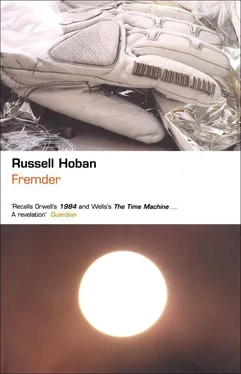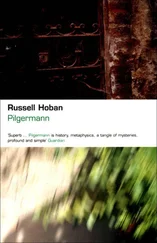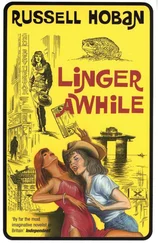Russell Hoban - Fremder
Здесь есть возможность читать онлайн «Russell Hoban - Fremder» весь текст электронной книги совершенно бесплатно (целиком полную версию без сокращений). В некоторых случаях можно слушать аудио, скачать через торрент в формате fb2 и присутствует краткое содержание. Год выпуска: 2003, Издательство: Bloomsbury, Жанр: Современная проза, Фантастика и фэнтези, на английском языке. Описание произведения, (предисловие) а так же отзывы посетителей доступны на портале библиотеки ЛибКат.
- Название:Fremder
- Автор:
- Издательство:Bloomsbury
- Жанр:
- Год:2003
- ISBN:нет данных
- Рейтинг книги:4 / 5. Голосов: 1
-
Избранное:Добавить в избранное
- Отзывы:
-
Ваша оценка:
- 80
- 1
- 2
- 3
- 4
- 5
Fremder: краткое содержание, описание и аннотация
Предлагаем к чтению аннотацию, описание, краткое содержание или предисловие (зависит от того, что написал сам автор книги «Fremder»). Если вы не нашли необходимую информацию о книге — напишите в комментариях, мы постараемся отыскать её.
Fremder — читать онлайн бесплатно полную книгу (весь текст) целиком
Ниже представлен текст книги, разбитый по страницам. Система сохранения места последней прочитанной страницы, позволяет с удобством читать онлайн бесплатно книгу «Fremder», без необходимости каждый раз заново искать на чём Вы остановились. Поставьте закладку, и сможете в любой момент перейти на страницу, на которой закончили чтение.
Интервал:
Закладка:
All three books bore on their flyleaves the date 16.2.84 and S.P.C.K London written in a German-looking hand. Elias always entered the date and the name of the shop in the secondhand books he bought; these were from the long-gone bookshop of the Society for the Propagation of Christian Knowledge that used to be in the Marylebone Road. As a child Helen Gorn must have loved the neat 1860 wood-engravings in the Carolsfeld book; in them the universe was a graspable proposition and on the Sabbath God snoozed in a cloud-swing between the sun and the moon and stars, his hands folded across his stomach and his bare feet on the ball of the earth while fourteen angels sang whatever angels sing on Sundays. But even when she was a child I think the god she spoke to was the old savage one who could never be pictured and whose name was an unpronounceable tetragrammaton. When I look at that book now, as when I first saw it that night on the roof with Lowell Sixe, the ravens of Rannoch Moor come between me and the visual marzipan of those engravings.
‘You ever heard of the Elijah Project?’ said Sixe.
‘The Elijah Project — was that to do with flicker drive?’
He shook his head, looked out over the lights of Oldtown and had another drink. He was a sad man but I could see that he felt good having someone to tell his story to. ‘In 2016 Helen Gorn was eighteen and her brother Izzy was thirteen. They were living in that big house in Oldtown West 71 with their housekeeper. That summer Helen sat her Professionals in Neurophysiology, Physics, Fractals, and Speculative Mathematics at the Corporation School of Science and Technology. She got As in everything but she wasn’t having much fun. She’d never had a boyfriend — she’d been hoping to go to the May Ball with a boy she liked but it didn’t happen. She said she’d begun to feel invisible — she half expected people to try to walk through her in the walkways or sit on her in the wirecar.
‘Her parents had killed themselves in August seven years before and August was always a hard month for her to get through. That summer of 2016, years before I ever met her, she began to think a lot about being and not-being. She kept notebooks, wrote down her thoughts and quotations from things she read. Here’s a notebook page from that time.’ He gave me a folded photocopy and a pocket torch and I read in my mother’s handwriting:
14.8.16
Dream : clustered hollownesses arching to a point as in an Islamic muqarnas vault that makes the transition from base to dome, from cube to sphere, earth to heaven — clustered hollownesses glowing with a luminous ancient proto-red — I am this muqarnas vault of clustered red — I am immensities of geometrically multiplied red ascending to an unseen dome — I have no speech, the clustered hollownesses are my speech — I am recesses of goneness — I am like the many emptinesses left where the seeds of a pomegranate have been eaten — in each emptiness is the shape of the seed, ghost of the seed, shape of the idea of the pomegranate of me, of the manyness of what might or might not be me — a manyness of possible me/not-me selves.
16.8.16
Non-architectural muqarnas — of time, of sex. The soul’s need making the transition from base to dome, from this to other? Clusters of thought, of emotion, of transition. Clusters of possibility and transition.
17.8.16
When I ask people whether they experience being as a smoothly continuous state or a flickering one they all say it’s smooth and continuous for them. For me it’s always been a flickering. Not visually — I’ve never actually seen the black between the pictures in my eyes but I’ve sensed it in my brain and for that reason I don’t make any assumptions about reality. Can it be that the world flickers? Can it be that the chair I sit on is only rhythmically and repetitively but not continuously there? Why don’t I fall to the floor between therenesses? How do I manage to flicker synchronously with the chair?
*
Standing on the roof of that building at three o’clock in the morning and reading the thoughts of my dead mother when she was young made my throat ache. All around me were the night lights of here and now; in the distance was the purple glow of the Ziggurat that never slept, while like a single cell containing all the genetic information for a complete organism, these fragments of my mother’s past seemed to contain my whole being, not only what I remembered but also what I never knew, events and presences beyond my recall. Sixe decently averted his eyes and handed me another photocopy, saying without looking at it, as if quoting from a mental catalogue, ‘Extract from a letter from Victor Lossiter to Helen Gorn dated 17.2.19.’
I read:
… I agree with what you say about Kant’s empty time and space: if there are empty time and space before and after the world, then they are time and space of other than the actualised world, in which case the accessing of other can be considered as a hypothetical possibility in propositions aimed at calculating the means of such access. Intermittency of matter manifests itself in a ‘world-pulse’ of very-low-frequency emissions below the infraband. A profile of this pulse-rate should yield the intervals in which the non-being reserve of the zoetic carrier wave can be matched to the world-pulse to allow crossover.
The world-pulse has so far not been calibrated and although I’ve tried to calculate it by extrapolation I’ve not been successful. In experiments with rats I’ve attempted crossover by bracketing the most likely frequencies but the EEGs have been inconclusive; there is very little observable deviation from the EEGs of the control group but in every case trauma is evident and all the rats have died.
If I can get a grant for the equipment and the help I need I can calibrate all emissions and separate the WPR from everything else. All I need is satellite time with the Hawking radio telescope, about forty fractal analysts, and a month or so with the PN20. Time, strength, cash, and patience!
‘He got the WPR measured — I remember reading about that,’ I said.
‘That’s right,’ said Sixe. ‘Corporation funded his research and he measured the world-pulse rate in 2021. Here’s one more bit for you to look at.’ He gave me a photocopy of an extract from another letter from Lossiter to Helen Gorn, dated 23.4.21:
… I’m enclosing a copy of my printout. It’s as we both expected: a sub-infraband nonlinear oscillation moving rhythmically from quiescence to excitation and showing marked similarities to the B-Z.
It may be that circumstances will prevent my continuing with this research but I think the WPR data will enable you to move on to the next stage of your work.
Good luck,
Victor
‘Was this all to do with flicker drive?’ I said.
‘No.’
‘Are you going to tell me what it was about?’
‘It began with some ideas of Helen’s.’ He produced a thick bundle of folded photocopies, found the desired one immediately, and read: ‘“27.8.16, A quantum wave of strangeness. The stranger who appears. Elijah as collapse of wave function, his world precipitated from an infinite wave of possibilities. Suddenly he’s there bringing his reality that is now the only reality.”’
Hearing my mother’s thoughts articulated by this man was a strange experience. I once read an interview with Ilse Bak in which she said that in order to play Chopin she had to become Chopin. This old man, animated now by what he was reading, became in some way my mother. I said, ‘This is all about the many-worlds interpretation of quantum physics, right?’
‘Right. Elijah just turns up in First Kings 17: bang, there he is with nothing at all leading up to his arrival. Helen was wondering whether Elijah might have got into this world by jumping out of another one.’
Читать дальшеИнтервал:
Закладка:
Похожие книги на «Fremder»
Представляем Вашему вниманию похожие книги на «Fremder» списком для выбора. Мы отобрали схожую по названию и смыслу литературу в надежде предоставить читателям больше вариантов отыскать новые, интересные, ещё непрочитанные произведения.
Обсуждение, отзывы о книге «Fremder» и просто собственные мнения читателей. Оставьте ваши комментарии, напишите, что Вы думаете о произведении, его смысле или главных героях. Укажите что конкретно понравилось, а что нет, и почему Вы так считаете.












